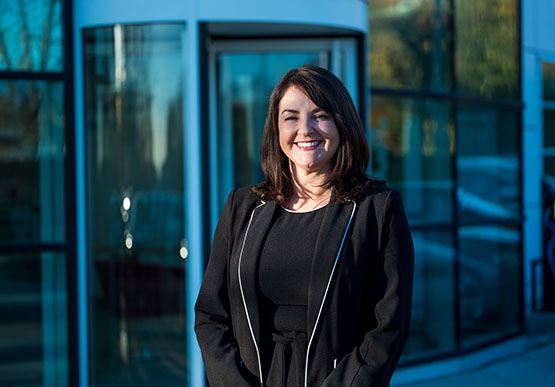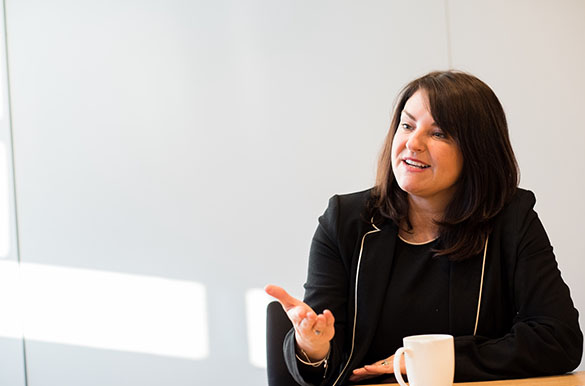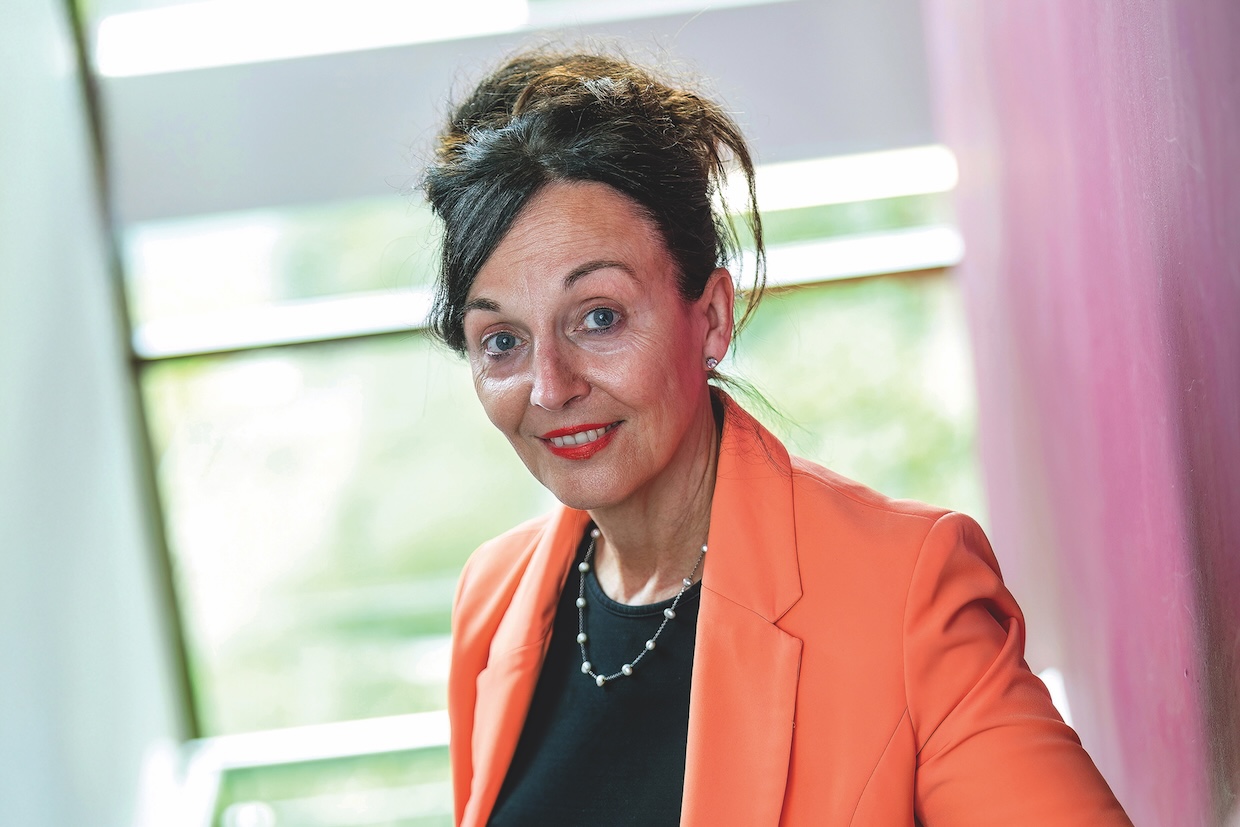Interview: Amanda Oates, Mersey Care NHS Foundation Trust

Mersey Care’s HR director Amanda Oates tells MiP how adopting a ‘just and learning’ culture has cut disciplinaries by 80% and improved patient care.
Too many senior NHS leaders are in denial about how their disciplinary processes are operating, says Amanda Oates – and until recently, she was one of them.
Oates became executive director of workforce at Mersey Care NHS Foundation Trust in January 2015, overseeing 3,500 staff delivering mental health, addiction and community health services across the North. Back then, she didn’t recognise the trust’s approach to disciplinaries was harmful to staff. “But the reality is that the higher you get up the tree, the more disconnected you can be from how your procedures are operationalised,” she says now. “I didn’t believe that was going on in my organisation.”
The reality began to hit home, she says, in one-to-one meetings with staff who’d been through the process. About 4% of staff faced disciplinary action every year and, while over half of all investigations found there was ‘no case to answer’, many of those affected had suffered terribly. Suspended for long periods and subject to insinuations about ‘no smoke without fire’, even exonerated staff had encountered problems ranging from mental health issues to stalled careers.
“Saying a suspension is ‘non-prejudicial action’ doesn’t mean it doesn’t cause harm,” says Oates. “Hearing the impact on them was horrendous. I had staff members saying things like: ‘I looked at my life insurance policy.’ It’s probably the only time in my career I can remember crying publicly”.
Fear of blame
Further danger signs emerged in disciplinary hearings, where staff were regularly caught lying. HR training typically holds that “if a staff member lies to you, the employer-employee relationship is broken,” says Oates. But she soon realised why people weren’t telling the truth: “Because they didn’t believe in the system; they didn’t believe it would be fair.”
Indeed, Oates found that staff were so fearful of becoming the fall guy they were keeping quiet about incidents of poor care. “To have optimum patient safety, staff need to feel safe themselves. You need a system which allows you to tell your boss bad news,” she says. “Do staff feel that they’ll be supported in getting to the root of an issue without being blamed?”
When that’s not the case, she adds, people “find ways to navigate around policies and procedures” – protecting themselves but increasing systemic risk. And they stop telling line managers when things are going wrong. When Mersey Care took over the failing Liverpool Community Health NHS Trust (LCH) last year, Oates found that during the previous four years – despite LCH’s terrible performance – only one member of staff had approached managers with a concern over care standards. “They were going to the CQC and MPs instead,” she says.
So a process intended to identify the causes of poor care had inadvertently shut off the flow of information about risks to patients, whilst dozens of employees – the majority blameless – were being forced through highly damaging processes which they viewed as exercises in buck-passing. This was not an HR system that Oates wanted to run. “My youngest daughter wants to be a nurse, and I want her to work in an NHS that looks after her: that supports her, personally and professionally, to be the best nurse that she can possibly be,” she says. “We can only do that if we treat our staff fairly and compassionately, and help them learn along the way.”
A new approach
Teaming up with union representatives, Oates devised and piloted a completely different approach to disciplinaries. And a few years on, while Mersey Care’s workforce has more than doubled with the absorption of LCH, the proportion of staff subject to disciplinaries has plummeted by 80% to around 0.5% of the combined workforce. As a result, the trust is saving £2.5m annually in HR and payroll costs, while employee and union relations – and feedback from staff about patient care standards – are much improved.
Oates’s work is now receiving national attention: she was recently named HR Director of the Year in the Healthcare People Management Association’s annual awards. But it wasn’t an easy journey: “It’s been the rawest thing I’ve ever done,” she says. And how was it done? Oates’s first step was to look at how and why disciplinaries were being instigated.
Trusts don’t set out to victimise staff, she says: disciplinary cases were being brought to investigate specific instances of poor care. But the nature of the process leads to a “focus on individuals, rather than looking at wider systemic or organisational issues,” she argues. “It’s human nature. It’s easier to say: ‘You haven’t done something’ than to understand all the contributing factors which mean that something hasn’t been done.”
So disciplinaries become a way of shifting the blame for poor care onto an individual – missing opportunities to address wider problems. And this focus on the individual opens up the space for discrimination: like many trusts, Mersey Care sees a disproportionate number of ethnic minority staff caught up in disciplinaries.
In the worst cases, disciplinaries can even become a tool for deliberately suppressing staff concerns about patient care. Bill Kirkup’s NHSI report on LCH’s disastrous culture linked disciplinaries to bullying by middle managers, adding that “staff would be suspended without being told why… for many months without any apparent process for resolution”.
A just culture
Oates’s solution drew on the principles set out by Australian psychologist Sidney Dekker – champion of the ‘just culture’ concept. “This approach asks what was responsible, not who was responsible,” she explains. It puts individuals’ actions in context and seeks to identify other issues that contributed to the problem.
A pilot was run discreetly in one division of the trust, with the simple goal of reducing the number of disciplinary investigations and suspensions.
Some disciplinaries could be averted by gathering information informally – identifying and addressing any systemic issues rather than launching an investigation. This required trade unions to trust the motives of HR staff and advise their members to cooperate; there could be no suspicion that the process was being used to gather evidence for a subsequent disciplinary.
Meanwhile, Oates stripped the “retributional and legalistic” language out of HR policy documents; commissioned training in Dekker’s principles for HR staff, union reps and managers; and reshaped line managers’ assessments to emphasise their responsibilities for team members’ wellbeing. An oversight committee was established with union colleagues, and learning ambassadors were appointed amongst frontline staff.
Where disciplinaries did go ahead, Oates worked to keep the number of suspensions to an absolute minimum: “We’re trying to keep people in work,” she insists. “That’s really important for their psychological wellbeing and safety.” New counselling and liaison services were established to support staff and keep them informed of progress, and HR caseworkers focused on completing the process as rapidly as possible – something that became easier as the number of new cases fell.
Learning from experience
The pilot was crucial to developing the new approach, she recalls: “We learned along the way – we scraped our knees, banged our elbows, and kept the dialogue going right the way through.” One key change tweaked Dekker’s approach to encompass a ‘just and learning culture’ – highlighting the core goal of identifying and tackling the causes of poor care. Oates also made the difficult decision not to apply the new approach retrospectively: “We’re not reinvestigating the past; we have to draw a line,” she says.
Determined that HR staff should approach incidents with a completely open mind, Oates also agreed with the unions to replace the decision tree system used at the beginning of the pilot with a set of values-based principles that give HR staff much greater autonomy and flexibility.
 “For everybody who’s praised us for doing it, there’s been someone saying: ‘I can’t believe you’ve washed your dirty linen in public, Amanda!’”
“For everybody who’s praised us for doing it, there’s been someone saying: ‘I can’t believe you’ve washed your dirty linen in public, Amanda!’”
Over time, the pilot built an essential platform of trust and buy-in among those involved: “It created a lot of commitment from staff side, HR, managers,” she says. “And when we felt it worked, we felt able to take it to the rest of the organisation.”
Tested and honed during the pilot, Mersey Care’s ‘just and learning culture’ hasn’t just slashed the number of disciplinary cases. Crucially, it has also fostered an environment in which unions “encourage their members to speak the truth, because they see that we genuinely want to understand, to learn and to make the right decisions – not to beat them with a stick,” says Oates. “We’re seeing people raising issues in a much more fluid and informal way; and they’re getting dealt with outside a formal HR process.”
Vicious circle
It all sounds very sensible. So why aren’t more organisations going down the same road? Oates says the biggest obstacle is the reluctance of senior leaders to “release your vulnerability: to say that you aren’t getting it right”.
When the trust released a video featuring the painful stories of people who’d been through the disciplinary mill, Oates recalls, the reaction was mixed: “For everybody who’s praised us for doing it, there’s been someone saying: ‘I can’t believe you’ve washed your dirty linen in public, Amanda!’”
This neatly illustrates the vicious circle in which trusts can become trapped. When organisations fear criticism, disciplinaries can become a way of loading blame for a service failure on individuals – distracting attention from systemic and management factors. But the more this blame culture masks the structural problems, the uglier the picture revealed when organisations take a hard, honest look at themselves – and the more courage is required to open up.
“Your board has got to be willing to say it, and show it, as it is; to apologise and say they’re going to learn from it,” comments Oates. “Are your chief executive, your HR team, your board ready to go there? Because it’s going to hurt.”
And this isn’t the quick, sharp pain of pulling off a plaster. Organisations must constantly “regenerate that openness, vigour and transparency,” says Oates, “taking it on the chin when we get something wrong, and saying, ‘We let this individual down’.” Mersey Care still handles some disciplinaries badly, she adds; but these days it owns its mistakes, learns the lessons – and asks the wronged party if they’re interested in joining the programme as a ‘just and learning ambassador’.
Going the full way
Three years into the programme, Oates is clear that there’s still a long way to go: “But I know we’re a damn sight better than we were, and my aspiration is that we go the full way – making it a damn sight better for everybody, every day; and applying this approach in everything we do.”
Oates says introducing Mersey Care’s just and learning approach has been “one of the most rewarding things I’ve ever done, personally and professionally”, although any journey built on self-criticism is bound to be difficult. “You’ve got to be prepared to feel painful and raw,” she says. “You question yourself; your ability to drive the change.” But without that honest self-criticism, no organisation can ever really know its faults – nor address them.
“Sometimes we listen in order to create a plan, or to close something down,” she concludes. “But we need to listen to understand. Because it’s only through understanding that we can learn the truth.”
Related News
-

Daniel Elkeles: “There’s a lot of green shoots here—the NHS is in a much better place”
As NHS Providers annual conference gets underway in Manchester, we speak to chief executive Daniel Elkeles about next year’s merger with the NHS Confederation and the future for NHS trusts in England. He tells Alison Moore that providers are “well placed” to deliver the Ten-Year Plan—but warns an unhappy workforce and a lack of investment could throw big spanners in the works.
-

Angela Hillery: “Nobody can do this on their own”
Angela Hillery, chief executive of community trusts in Northamptonshire and Leicestershire, is one of England most influential NHS leaders and a pioneer of collaborative working. She talks to Craig Ryan about why integrating services offers the best chance of overcoming a hostile environment and turning the NHS around.
-

We’ve given NHS management a home – we care for it and campaign for it
MiP is 20 years old this summer and its chief executive, Jon Restell, has been there since the beginning. He reflects on the union’s past, present and future in conversation with Healthcare Manager editor Craig Ryan.